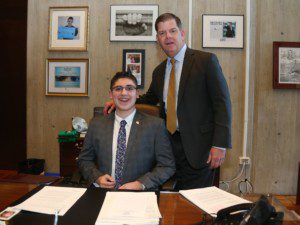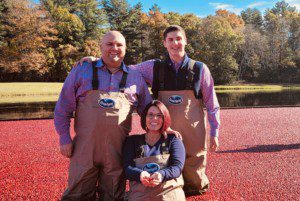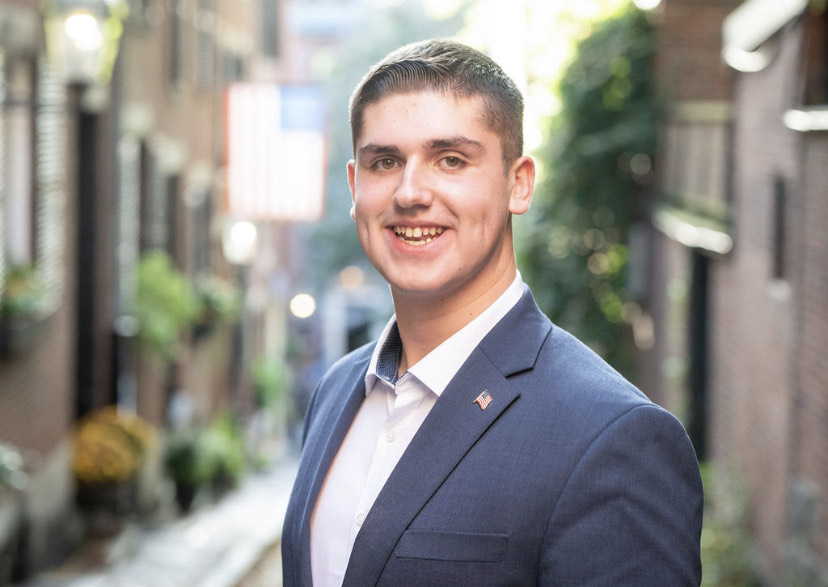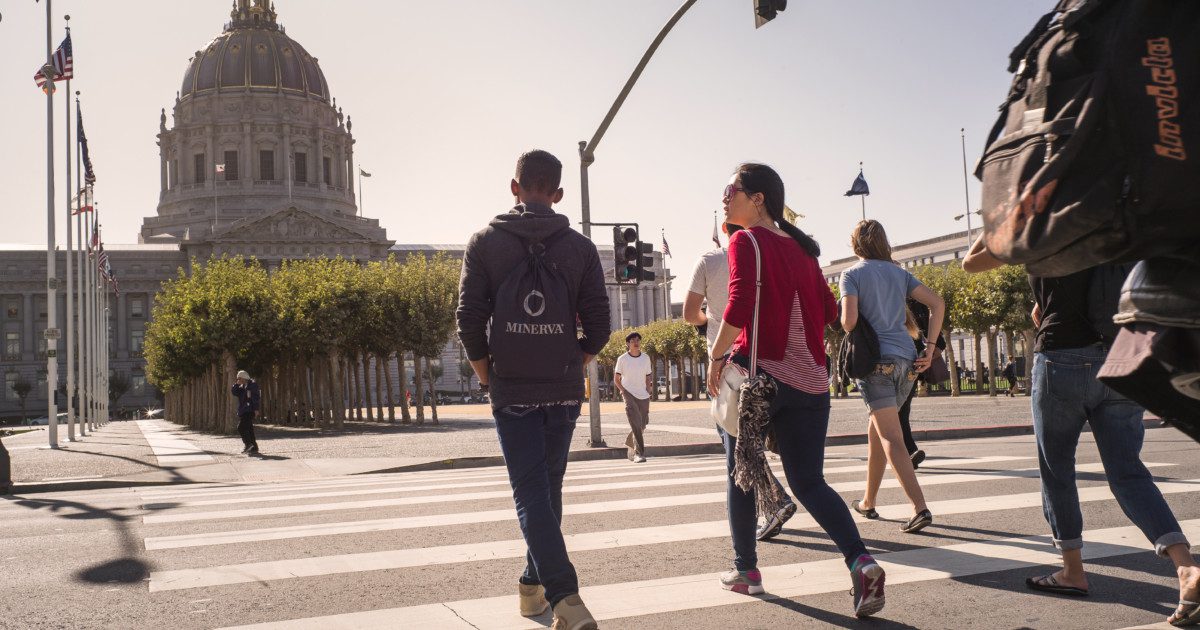After a long day of classes and extracurriculars at St. John’s all-boys high school, 17-year-old Carson Domey greets me on camera in a dark suited, navy blazer and tie. “So sorry, I’m in a car,” he says, waiting to pick up his mother from the airport parking lot on a Wednesday night. He apologizes for taking this interview in the driver’s seat, but I think, metaphorically, “How appropriate.”
Carson Domey is one of the young adults we hear about in the news today – the “Gretas” of the world who are leading the future and bringing issues to the forefront of our policymakers. In the summer of 2019, he was fifteen when he contacted legislators across the state, meeting with and speaking to over 100 of them to fight mental health stigma. This level of determination and dogged pursuit may seem unusual for someone so young, but not for Carson Domey, who’s been advocating for legislative change at the Massachusetts State House since he was eleven years old.

Carson Domey and U.S. Secretary of Labor, Martin J. Walsh
Carson was diagnosed with a rare form of Crohn’s disease at age seven, being treated by medical care professionals at Boston Children’s Hospital. His experience with having to commute into Boston for his regular treatments led him to his advocacy work on telemedicine and the start of a non-profit that eventually became known as “Carson’s Crew.” He was instrumental in the passage of a bill in the Massachusetts legislature expanding the use of telemedicine and was featured in the Boston Globe. He was in middle school at the time.
“The big premise of the actual nonprofit – the mission statement – is to make a difference in the lives of patients and families, through innovation and technology,” Carson said. While seeking to expand access to telehealth services in the Commonwealth, his journey over the past decade has only shown to grow his passion for mental health and telemedicine advocacy. “Mental health is undoubtedly coordinated to physical health as well. We thought that it was important to be able to use that [in our nonprofit campaigning] as an avenue to work change into the mental health sphere,” he remarked, well-versed.
This level of determination and dogged pursuit may seem unusual for someone so young, but not for Carson Domey.
Carson’s latest lobbying efforts are also personal. In his freshman year in high school, Carson lost a friend to suicide. He turned his grief into pushing for greater widespread education surrounding mental wellbeing. At the beginning of his sophomore year in 2019, he led an initiative with his headmaster to add the National Suicide Prevention Lifeline to the back of his school’s student identification cards.
The initiative resulted in an outpouring of press – along with outreach from a state legislator from Framingham, MA with a bill to do exactly that. Bill H. 2111, “An Act Relative to Student Mental Health,” would require the suicide prevention lifeline to be included on high school and college student identification cards. “I started getting involved working with his office and the Senator who was proposing that on the Senate side as well,” said Carson. With an already built foundation and network advocating for telemedicine services, it made it easy for him to parallel those efforts with mental health.
Today, the teenaged wunderkind who has not yet entered college finds himself working with the country’s renowned politicians in the Commonwealth to pass bills on expanding access to mental health education and resources.
“I was very lucky. I started just reaching out to, you know, the members of the committee that the bill will sway. The response was so well-received that I said, ‘you know what, let’s try moving outward a little bit to people that are not too directly impacted with the bill, as to the level of some of the committee members.’ And I was honestly shocked with the amount of responses that I got.” Carson pitched emails to state legislators, providing them with a snapshot of his story, his involvement with telemedicine, and his interest in politics. To much of his surprise, many of them were willing to meet with him.
“For them, not only do they get to hear a story of someone that has personal experience relevant to a bill that’s ongoing, but also to [be able to] kind of mentor the next generation in a sense, too.” Many times, Carson was able to meet lawmakers one-on-one, allowing for more genuine and candid conversations.

Carson Domey and Governor of Massachusetts, Charlie Baker
Contrary to popular belief, Carson says that he hasn’t had many issues or hurdles to changing legislators’ opinions when it comes to mental health awareness. “Mental health is likely one of those issues that, in 2021, is an undoubtedly bipartisan topic. I’ve yet to meet someone who has said that they’re against expanding access to mental health resources,” Carson said.
If anything, he says, it’s been more of a challenge for him at the local level to help some of his peers at their schools expand access to resources, where he’s seen the most pushback. It can be a hard topic for schools to address, he says. However, for many high schools, where a large percentage of students could be at risk for mental health issues, such as depression, suicide, and substance abuse, it can be lifesaving to have these difficult conversations.
For young men his age, he recognizes how rare it can be to see male peers talk about mental health. “I think it’s really hard to start those conversations, period, not to mention with teenage men,” Carson said. “Unfortunately, I don’t think the issue of mental health is going to be disappearing anytime soon.” He says that it’s going to take a generation to change that.
“It’s interesting how mental health plays culturally. At the end of the day, no amount of policy is going to lead to a solution with this. It can only help start to move us in the right direction. I really do believe that in order for us to get out of this crisis that we’re experiencing, when it comes to mental health, it’s a cultural shift – a cultural change of people recognizing that it’s okay not to be okay.” Through more public conversations and integrating resources in communities, mental health can be de-stigmatized. Carson has come to appreciate the wellness days offered at his school, when nonprofits geared towards suicide prevention give presentations on mental health.
In some ways, Carson believes that COVID may have challenged stereotypes on mental health. “I think COVID exacerbated [the conversation on mental health] to a huge level. Everyone experiences hardships at some time in their life. However, I think COVID, across the board, [was a] hardship for everyone in some way or some form. It definitely brought everyone to the mutual understanding that we all need to do more to take care of ourselves and take care of each other,” Carson says.
“I think we’ve seen the world adapt very quickly in the past, you know, 18, 19 months now. But I really think if we can start mental health education at a younger age, that’ll be able to eliminate the stigma,” Carson said. A number of different bills in the state legislature are aiming to change the definition of physical education to include mental health education in grades K-12.

Carson and his father and mother
Carson’s knack for public speaking, and his savvy sense of the political world, pave a bright future for him in politics and law. Throughout our call, he checks his notes, having done the due diligence of writing down all of the key points he wanted to convey. In fact, it’s hard for him to keep track of all of his accomplishments over the years. He refers to old photos on his phone to remember exactly when he’s done what – the politicians he’s met, the presentations he’s given, the conversations he’s had, the bills he’s testified for.
He says he owes his mother and father enormous gratitude in helping him reach the level of impact he’s made. As we closed out our interview, he asked if we could use a photo of the three of them in a cranberry bog at Ocean Spray, where his father works. That would be in addition to the ones of him with Governor Charlie Baker.




